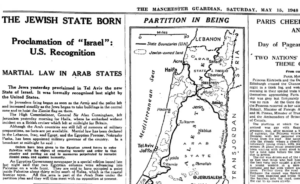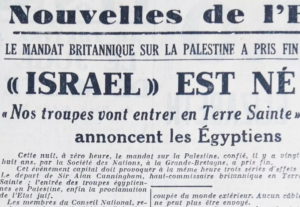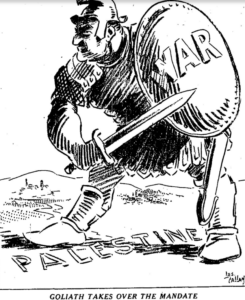On May 14, 1948, as the British Mandate of Palestine came to a close, political representatives of the Jewish community gathered in Tel Aviv to hear David Ben-Gurion proclaim the establishment of the State of Israel and the re-establishment of Jewish independence in the Land of Israel after nearly 2,000 years.
Soon after the declaration of independence, five neighboring Arab armies invaded Israel, forcing the nascent Jewish state to fight for its survival.
How did the international press react to the founding of the State of Israel and the subsequent Arab invasion? Which aspects of Israeli independence did the news focus on, and which aspects did they ignore?
Here’s how the global media reported on Israeli independence in the hours and days following Ben-Gurion’s fateful declaration.
The New York Times Gives Extensive Coverage to Israeli Independence
On May 15, 1948, The New York Times dedicated a large proportion of the first three pages of that day’s newspaper to coverage of the nascent Jewish state.
This included a detailed description of the independence declaration, reports on the Arab invasion (including the bombing of Tel Aviv) and military clashes, accounts of United Nations debates, and news of Jewish celebrations in Israel and the United States. The reports contrasted American recognition of the new Jewish state and British “aloofness” toward it.
In addition, page 2 of that day’s newspaper featured a complete English translation of the Israeli Declaration of Independence.
The front page #OTD in 1948. The state of Israel is created. #nytimes pic.twitter.com/svj530uzzi
— New York Times OTD (@OnThisDayNYT) May 15, 2017
The Manchester Guardian Focuses on the British Angle
In its coverage of Israeli independence, the Manchester Guardian (now known as The Guardian) focused on the independence ceremony in Tel Aviv, the retreat of British forces, and the effect that the Arab invasion of the nascent Jewish state would have on its borders as set out in the 1947 United Nations Partition Plan.
In its lead editorial, The Guardian expressed reserved optimism at the new Israeli state’s ability to instill order in the areas under its jurisdiction and cautioned against Israel taking an offensive military stance that could prolong the war with its Arab neighbors.
However, The Guardian reserved its more biting words for the British Mandate and colonial authorities for letting their vague and hypocritical policies toward both the local Jewish and Arab populations lead to the Mandate’s “ignoble end” and the bloodshed that was currently wracking the region.

UPI Focuses on the Military and Diplomacy
In its May 14 report, the United Press International (UPI) wire service mentioned the independence declaration in passing while focusing heavily on the military and diplomatic fronts.
UPI’s report centered on the heavy fighting in Jerusalem, Israeli and Arab military movements throughout the region, and the retreat of British forces from Palestine. The report also mentioned recent American attempts to delay Israeli independence.
Notably, due to the immediacy of the report, no mention was made of the United States’ recognition of the nascent Jewish state (that occurred at midnight on May 15), with the report concluding that it was unknown what direction the US would take following Israeli independence.
Interestingly, the UPI interspersed some religious sentiment within its report, noting that “The Jewish dream of nearly 2,000 years – a state of their own – came true” and writing that Jewish forces “were in combat with Arab warriors from Dan to Beersheba, the Biblical limits of the Holy Land.”
Related Reading: History Channel Doctors Israeli Declaration of Independence
Le Figaro Succinctly Summarizes the Day’s Events
One day after Israel’s creation, Le Figaro provided its readers with a concise summary of the events of May 14.
Under the headline “Israel is born,” the French daily focused on the three major events of the preceding day: The departure of the British from the Holy Land, the creation of the Jewish state (including excerpts from the Declaration of Independence), and the heightening of the conflict between the newly-founded Jewish state and its Arab neighbors, particularly Egypt.
Le Figaro also mentioned in passing diplomatic discussions at the United Nations about an American proposal to send a UN mediator to the region to offset the growing conflict.

The Toronto Daily Star Appraises The Situation
On both May 14 and May 15, the Toronto Daily Star (now known as the Toronto Star) featured several different Israel-related stories on its front page from the AP and UPI wire services.
On page 6 of the May 15 edition, the Daily Star also provided its own take on the news from the Middle East under the headline “The Jewish Republic of Israel.”
Calling the creation of Israel “a great historic event,” the Canadian daily continued with an appraisal of the military strength of both Israel and its Arab neighbors and a brief historical synopsis of the region since the establishment of the British Mandate in 1923.
The Toronto Daily Star concluded its synopsis by extolling the virtues of peace and cooperation between the Jewish and Arab communities.
Page 6 of the May 15 edition also featured a questionable editorial cartoon captioned “Goliath Takes Over the Mandate,” which showed the Biblical Goliath, with “War” imprinted on his shield, standing aggressively over the word “Palestine.”

The Daily Worker Welcomes Jewish Statehood
It might seem surprising by today’s political standards, but the May 15 edition of the Daily Worker, the British Communist daily newspaper, noted that the creation of Israel “will be acclaimed by friends of peace and progress the world over…it will be greeted by all those who sympathise with the Jewish People to establish their own national home.”
One week later, in the May 21 edition, the Daily Worker expressed its “warmest greetings to the new Jewish State of Israel, whose foundation is a big step forward toward the fulfillment of self-determination for the peoples of Palestine.”
The Daily Worker then followed with a blistering attack on the US and Great Britain for – in its view – enabling the Arab invasion of the nascent Jewish state before demanding, among other things, that the British government officially recognize Israel.
Associated Press Newsreel Takes a Look at Israeli Independence
In 1948, newsreels shown in cinemas were one of the most popular ways to receive the news.
Following Israel’s independence declaration, the Associated Press released a newsreel highlighting aspects of the situation in Israel: The continuing conflict between the Jews and Arabs and its humanitarian toll (with a seemingly implicit bias towards the Arabs), the diplomatic intrigues at the UN, American recognition of Israel, and American Zionist celebrations.
The newsreel concludes with the words: “After 2000 years, a Jewish nation once again exists. And while there is a rattle of gunfire in the Holy Land, there is cheering in Washington and Hebrew dances of joy for a Jewish homeland that has been reborn.”
Liked this article? Follow HonestReporting on Twitter, Facebook, Instagram and TikTok to see even more posts and videos debunking news bias and smears, as well as other content explaining what’s really going on in Israel and the region. Get updates direct to your phone. Join our WhatsApp and Telegram channels!


